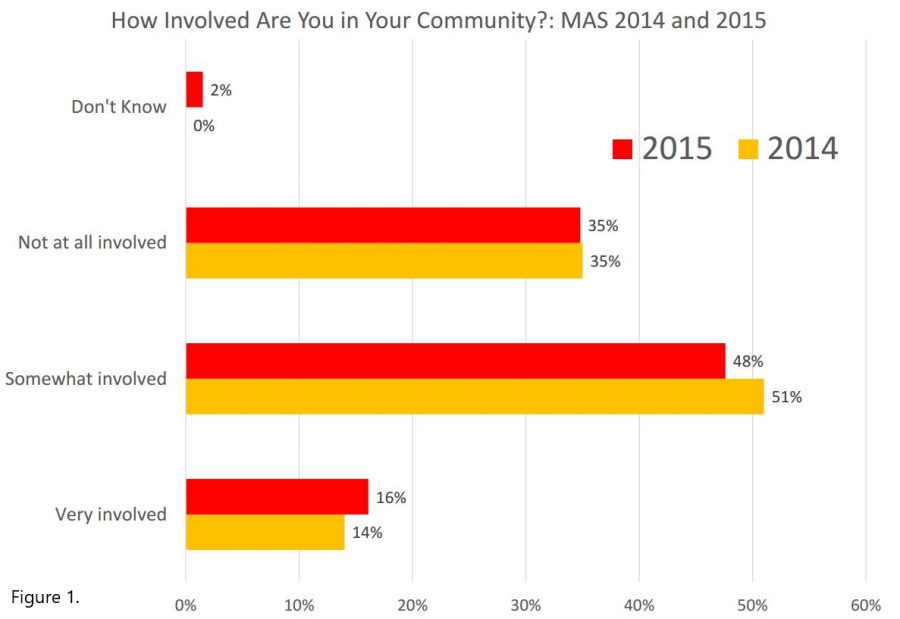
One of the questions asked in the 2015 Metro Atlanta Speaks survey was “How Involved are you in your community?” Residents were asked to respond with “Very Involved,” “Somewhat Involved,” “Not Involved at All,” or “Don’t Know.” A total of 5,029 residents in 13 counties responded. A subsequent question encouraged residents to reflect on their experiences in their communities such as volunteering, attending meetings, and engaging with schools and organizations.
For “How involved are you in your community,” total of 16% said they are “Very Involved,” 48% “Somewhat Involved,” 35% “Not Involved at All,” and 2% answered with “Don’t Know.” Figure 1 shows these 2015 results compared to the 2014 Metro Atlanta Speaks survey results. In 2015 more residents were involved in their communities; more respondents said they are “Very Involved” (a 2% increase over 2014) while fewer said they are “Somewhat involved” (a 3% decrease compared to 2014). It should be noted that the survey geography in 2015 was 13 counties compared to 10 counties in 2014.

By county:
Figure 2 shows the 2015 responses to this question for each county. Butts and Gwinnett counties have the greatest percentage of residents say they are “Very Involved.” Interestingly, Gwinnett County also has the second greatest percentage of residents say they are “Not Involved at All,” following Clayton County, where 43.1% of residents do not feel involved at all in their communities.
By demographics:
- Gender: Across all the counties, surveyed men more often felt that they are “Very Involved” (17.2%) compared to women (15.1%).
- Race: Residents were asked to identify as Black, White, or Other. The race that has the highest percentage of residents who feel “Very Involved” was Other (17.3%), which also has the highest percentage of residents who are “Not Involved at All” (39.9%).
- Latino: The majority of Latino residents (43.5%) do not feel involved at all in their communities, whereas the majority of non-Latino residents feel that they are “Somewhat involved” (49.8%).
- Age: The age group with the largest share of residents who feel “Very Involved” is 35-44 (20.1%), closely followed by residents aged 45-54 (19.9%). A large share of young residents, aged 18-24, feel that they are “Not Involved at All” (45.9%), followed by residents aged 65+ (40.9%) (see Figure 3).
- Children in household: More residents with children in their households feel “Very Involved” (18.6%) compared to residents in households without children (13.8%).
- Education: 50.8% of residents with less than a high school degree feel “Not Involved at All.” Reported levels of involvement increased as education increased; only 18.3% of residents with a graduate/professional degree do not feel involved.
- Income: Except for those residents at the lowest income level, the share of residents who are “Very Involved” increased with income. Conversely, the percentage of residents who are “Not Involved at All” decreased as income decreased (Figure 4).
The survey also asked residents if they attended or participated in the following community activities during the past year:
- PTA meeting
- Neighborhood association meeting
- Religious service/event
- Public meeting held by a county or city government
- Volunteering at a community event
For all the counties, “Religious service/event” is the top activity, followed by “Volunteering at a community event.” Figure 5 shows the activity breakdown by county and the average for the region.
See our previous Metro Atlanta Speaks posts, read the full Metro Atlanta Speaks Snapshot, and visit ARC’s Metro Atlanta Speaks webpage for more info.





